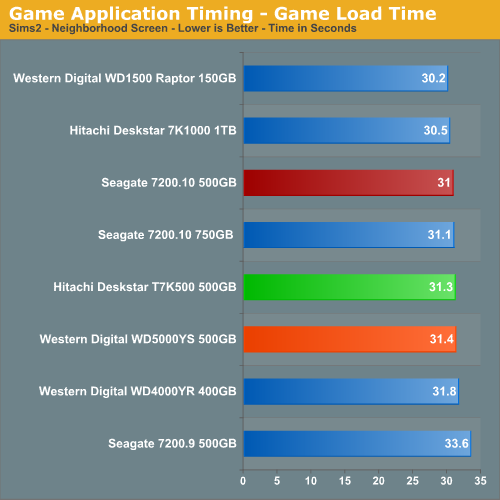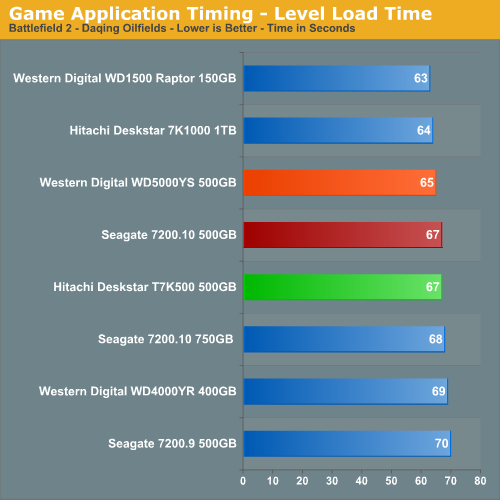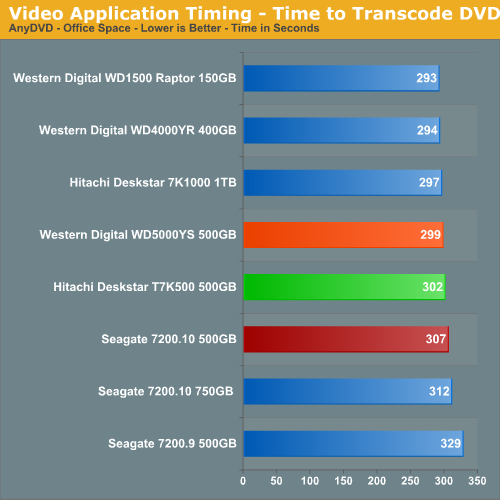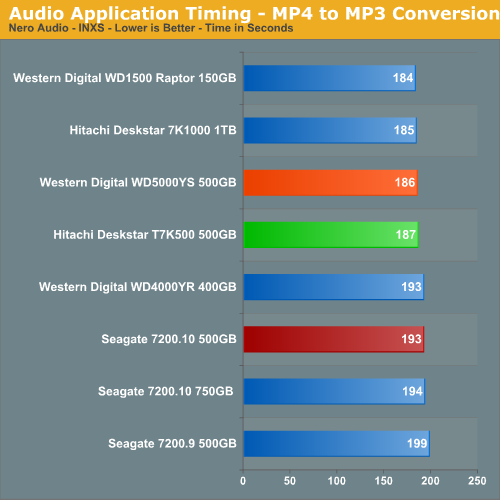Seagate 7200.10 500GB: Hitting the Sweet Spot
by Gary Key and Dave Robinet on July 6, 2007 11:00 PM EST- Posted in
- Storage
Actual Application Times
Our application benchmarks are designed to show application performance results with times being reported in seconds, with lower scores being better. While these tests will show some differences between the drives it is important to understand we are no longer measuring the pure performance of the hard drive but how well our platform performs with each individual drive. The performance of a hard drive is an integral part of the computer platform but other factors such as memory, CPU, core logic, and even driver choice can play a major role in determining how well the hard drive performs in any given task.
Game Load Test
Our Sims 2 - Open for Business test measures the time it takes to load the initial portion of the game. Our application timer starts when the game icon is initiated until the neighborhood menu appears.

The results are basically the same as our iPEAK results as the WD Raptor series continues to lead all drives; however, the performance differences are not as drastic once we take into account the entire platform. We notice the Seagate 500GB drive actually scoring slightly better than the Hitachi T7K500 after falling behind by about 38% in the iPEAK tests.
Game Level Load
This test centers on the actual loading of a playable level within our game selections. The Battlefield 2 test measures the time it takes to load the Daqing Oilfields level. Our application timer begins when the start single player icon is initiated and ends when the join game icon is visible.

The WD1500ADFD Raptor continues its pattern of being the best available drive for the gaming enthusiast and our subjective opinion also matches the test scores. That said, the larger capacity advantages of the 7200rpm drives certainly make up for the minimal loss in performance. Once again, our Seagate 7200.10 500GB drive is performing well and matches the performance of the Hitachi drive.
AnyDVD 6.1
Our next test utilizes the "ripping" function of AnyDVD to copy the Office Space DVD file from our source drive to our test drive. Our DVD features 29 files totaling 7.55GB of data and is an excellent test for determining the write speed of a drive.

Our Seagate Barracuda 7200.10 500GB drive finishes near the bottom of the pack along with the other Seagate drives. The Seagate drives just do not perform as well in actual application write speeds as their iPEAK results would indicate. The review drive is five seconds slower than the Hitachi in this test - a difference of 1.6%.
Nero Audio Encode
Our last test has us utilizing the audio encoding functions of Nero to convert our INXS Greatest Hits audio files in MP4 format to a high quality variable rate MP3 file for our portable player. Our test features 16 files totaling 137MB of data and is an excellent test for determining the read and write speed of a drive.

The test results show once again the amount of time a fast hard drive like the WD Raptor can save over the course of audio or video file manipulation session. Our Seagate 7200.10 500GB drive finishes six seconds behind the T7K500 - a difference of 3.2% - with results that mirror the Video tests.
Quick Take
The performance of the Seagate Barracuda 7200.10 500GB is good but not outstanding when compared to other drives in its class. In fact, based upon our preliminary test results with the latest Samsung and Western Digital drives, the drive almost seems a generation behind now. This will be resolved later this summer when Seagate introduces the new 7200.11 series that should retake the performance crown on the general desktop.
However, we have to realize that Seagate released this 7200.10 drive about a year before the Samsung and WD offerings so its true competition is the Hitachi T7K500 drive. Overall, the Hitachi T7K500 is the better performing drive but it comes at a $20 price premium and provides a three year warranty compared to five for the Seagate drive. The thermal and acoustic results favor the Hitachi drive but not significantly in our opinion, though our ears were bothered by the Seagate's "louder" than normal seeks.
We did notice in certain benchmarks that the Seagate 7200.10 drives have a tendency to perform poorly compared to the other drives when the seek distances are not clustered tightly or on the same track. This results in the requests not being available on the expected track or in cache, causing the drive to seek the information across the disc resulting in a traffic jam effect caused by the track to track seeks and resulting rotational latencies. In our testing, the Seagate 7200.10 drive seems to thrive on consistent read/write requests for medium to large size blocks of information providing seek distances are closely clustered. In our application test benchmarks, the drive fared better in the gaming benchmarks, indicating that while the pure hard drive performance is lacking when compared to the other 7200rpm drives, the drive would still be a very solid choice for a gaming machine.
Our application benchmarks are designed to show application performance results with times being reported in seconds, with lower scores being better. While these tests will show some differences between the drives it is important to understand we are no longer measuring the pure performance of the hard drive but how well our platform performs with each individual drive. The performance of a hard drive is an integral part of the computer platform but other factors such as memory, CPU, core logic, and even driver choice can play a major role in determining how well the hard drive performs in any given task.
Game Load Test
Our Sims 2 - Open for Business test measures the time it takes to load the initial portion of the game. Our application timer starts when the game icon is initiated until the neighborhood menu appears.

The results are basically the same as our iPEAK results as the WD Raptor series continues to lead all drives; however, the performance differences are not as drastic once we take into account the entire platform. We notice the Seagate 500GB drive actually scoring slightly better than the Hitachi T7K500 after falling behind by about 38% in the iPEAK tests.
Game Level Load
This test centers on the actual loading of a playable level within our game selections. The Battlefield 2 test measures the time it takes to load the Daqing Oilfields level. Our application timer begins when the start single player icon is initiated and ends when the join game icon is visible.

The WD1500ADFD Raptor continues its pattern of being the best available drive for the gaming enthusiast and our subjective opinion also matches the test scores. That said, the larger capacity advantages of the 7200rpm drives certainly make up for the minimal loss in performance. Once again, our Seagate 7200.10 500GB drive is performing well and matches the performance of the Hitachi drive.
AnyDVD 6.1
Our next test utilizes the "ripping" function of AnyDVD to copy the Office Space DVD file from our source drive to our test drive. Our DVD features 29 files totaling 7.55GB of data and is an excellent test for determining the write speed of a drive.

Our Seagate Barracuda 7200.10 500GB drive finishes near the bottom of the pack along with the other Seagate drives. The Seagate drives just do not perform as well in actual application write speeds as their iPEAK results would indicate. The review drive is five seconds slower than the Hitachi in this test - a difference of 1.6%.
Nero Audio Encode
Our last test has us utilizing the audio encoding functions of Nero to convert our INXS Greatest Hits audio files in MP4 format to a high quality variable rate MP3 file for our portable player. Our test features 16 files totaling 137MB of data and is an excellent test for determining the read and write speed of a drive.

The test results show once again the amount of time a fast hard drive like the WD Raptor can save over the course of audio or video file manipulation session. Our Seagate 7200.10 500GB drive finishes six seconds behind the T7K500 - a difference of 3.2% - with results that mirror the Video tests.
Quick Take
The performance of the Seagate Barracuda 7200.10 500GB is good but not outstanding when compared to other drives in its class. In fact, based upon our preliminary test results with the latest Samsung and Western Digital drives, the drive almost seems a generation behind now. This will be resolved later this summer when Seagate introduces the new 7200.11 series that should retake the performance crown on the general desktop.
However, we have to realize that Seagate released this 7200.10 drive about a year before the Samsung and WD offerings so its true competition is the Hitachi T7K500 drive. Overall, the Hitachi T7K500 is the better performing drive but it comes at a $20 price premium and provides a three year warranty compared to five for the Seagate drive. The thermal and acoustic results favor the Hitachi drive but not significantly in our opinion, though our ears were bothered by the Seagate's "louder" than normal seeks.
We did notice in certain benchmarks that the Seagate 7200.10 drives have a tendency to perform poorly compared to the other drives when the seek distances are not clustered tightly or on the same track. This results in the requests not being available on the expected track or in cache, causing the drive to seek the information across the disc resulting in a traffic jam effect caused by the track to track seeks and resulting rotational latencies. In our testing, the Seagate 7200.10 drive seems to thrive on consistent read/write requests for medium to large size blocks of information providing seek distances are closely clustered. In our application test benchmarks, the drive fared better in the gaming benchmarks, indicating that while the pure hard drive performance is lacking when compared to the other 7200rpm drives, the drive would still be a very solid choice for a gaming machine.










19 Comments
View All Comments
VooDooAddict - Sunday, July 8, 2007 - link
Transfer performance differences of most drives seems negligible for single drive end users. Actual formated size, heat, warranty, noise, and the ever important price are the keys for end users.That isn't to say your performance numbers are useful. I'd almost bet that engineers from SAN manufactures like EqualLogic check out these reviews. When you have those performance differences amplified by running 14+ spindles it's a little more noticeable.
Kaleid - Sunday, July 8, 2007 - link
with platter density at record high 334GB.PenGun - Sunday, July 8, 2007 - link
You know some of us need to know how fast a drive writes. Any reason that information is not available? All these stupid unzip the file are just braindead.lopri - Saturday, July 7, 2007 - link
What is the theoretical advantage of 'perpendicular' design? Out of curiosity.TA152H - Sunday, July 8, 2007 - link
Better density.psychobriggsy - Saturday, July 7, 2007 - link
5 year warranty.'nuff said.
Although a 3 year warranty isn't so bad, but that last 10% of performance really doesn't excite me when it's regarding hard drives.
Yeah, yeah, I'm justifying my 320GB 7200.10 :p
JakeBlade - Saturday, July 7, 2007 - link
Sorry, that should be 1 out of 10. (Drank too much wine with my steak tonight).LoneWolf15 - Sunday, July 8, 2007 - link
Got any stats to back that up? If so, I'd love to see them. 10% within 10 months seems like an awfully high failure rate to me (unless you're talking about long-defunct brands like JTS and Kalok).JakeBlade - Saturday, July 7, 2007 - link
5 year, 10 year, 15 year warranty. When the drive is made dirt cheap from the disenfranchised workforce in China, any hard drive company can easily slap a warranty on anything that needs 1 out of every 25 replaced within 10 months, while still making a huge profit from cheap manufacturing costs. My source: Newegg -- 266 reviews, first ~25 from lowest rating report DOA/Failure.Golgatha - Monday, July 9, 2007 - link
sarcasmYes, I can't imagine that those who received a DOA hard drive or one that failed within a short period of time being a little miffed and taking their frustration out on the Newegg.com ratings boards.
/sarcasm